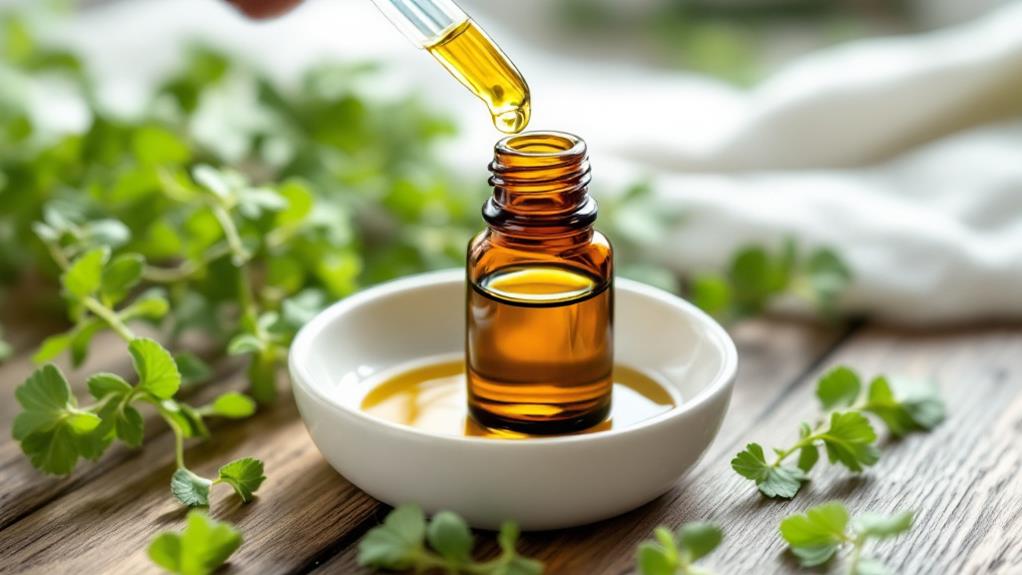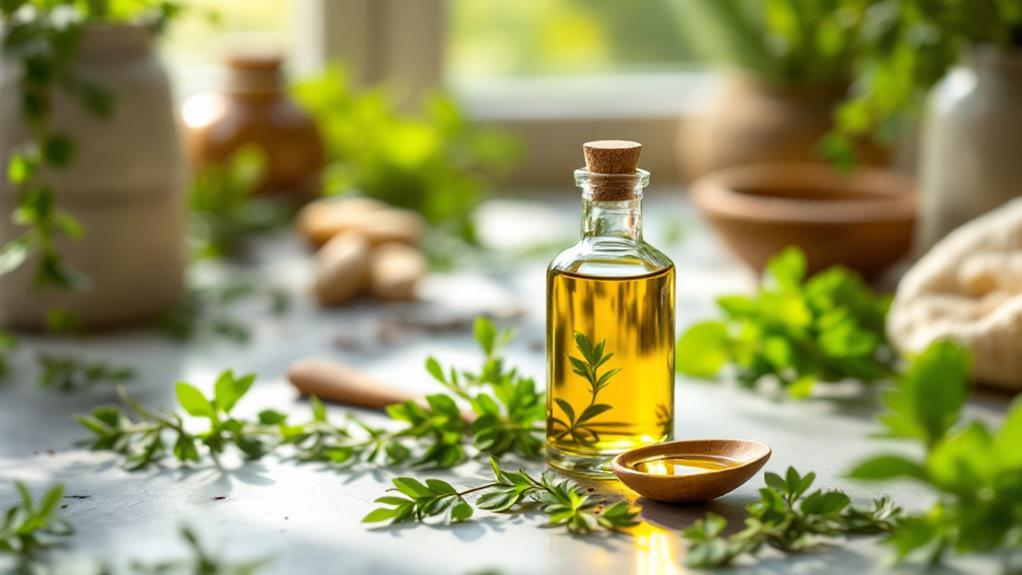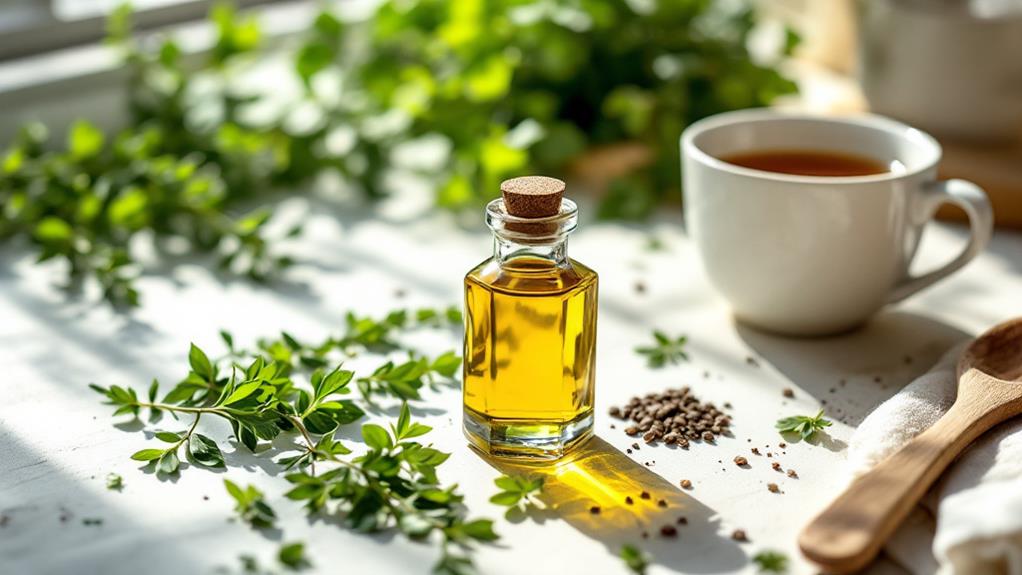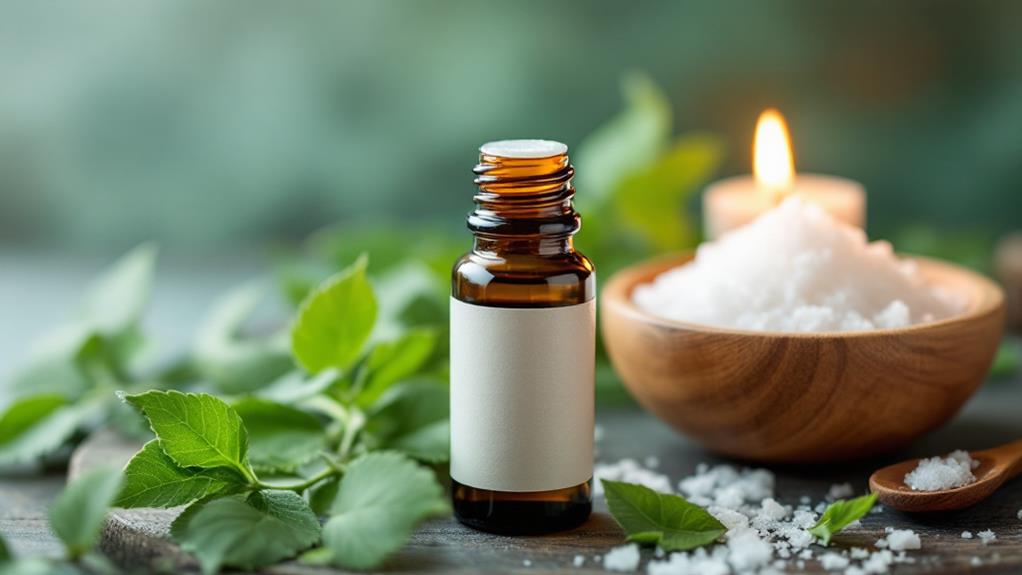How to Use Oregano Oil for Candida: A Natural Treatment Guide

To use oregano oil for Candida, start with oral supplements or tinctures. Take one softgel capsule after meals or mix three drops of liquid tincture in water twice daily. Gradually increase as tolerated. For topical application, dilute 1-2 drops with a carrier oil like coconut oil. Oregano oil's main compounds, carvacrol and thymol, effectively disrupt Candida cell membranes. Remember to consult a healthcare provider before starting and check for potential side effects like gastrointestinal discomfort. Take care to avoid during pregnancy or if you have iron deficiency. Uncover more about its multifaceted health benefits and usage tips next.
Understanding Oregano Oil
Understanding oregano oil requires delving into its powerful constituents and their effects. Oregano oil, derived from Origanum vulgare, is packed with important oils like carvacrol and thymol, known for their antifungal, antibacterial, and antiviral properties. These compounds offer significant health benefits, especially when dealing with fungal infections like Candida albicans. Carvacrol, in particular, plays a key role in disrupting the cell membrane integrity of Candida, inhibiting its growth and aiding in the body's defense against this persistent yeast.
When incorporating oregano oil into your regimen, consider both oral supplements and topical application. Oral supplements come in forms such as liquid tinctures and softgel capsules, but it's critical to use them according to the recommended dosages. For topical application, always use diluted oil to prevent skin irritation. Dilution guarantees that the potent important oils don't cause adverse skin reactions.
Before starting any new treatment, consulting a healthcare professional is necessary, especially if you're planning to use oregano oil alongside other antifungal treatments. Keep in mind that oregano oil may interact with certain medications and isn't recommended for those with iron deficiencies or during pregnancy.
Antifungal Properties
Oregano oil's antifungal properties are nothing short of remarkable, thanks to its key compounds carvacrol and thymol. These components work by disrupting the cell membrane integrity of Candida species, particularly Candida albicans. When you use oregano oil, you're tapping into a natural remedy that effectively inhibits the growth of this stubborn yeast. Studies even show that oregano oil delivers results comparable to conventional antifungal medications.
Carvacrol, in particular, stands out for its powerful antimicrobial activity. It's been found to be more effective than 18 pharmaceutical drugs at combating fungal infections, including those caused by resistant strains of Candida. So, if you've been struggling with Candida overgrowth, oregano oil might be the solution you've been searching for.
Additionally, the antifungal properties of this vital oil can improve the effectiveness of other antifungal treatments, creating a synergistic effect. This means that when combined with other therapies, oregano oil can provide an even more robust defense against Candida infections. Its ability to considerably reduce fungal colonies in vitro highlights its potential as a formidable natural remedy. By incorporating oregano oil into your treatment plan, you're leveraging a potent ally in your fight against Candida albicans.
Health Benefits

Frequently hailed for its robust health benefits, oregano oil goes beyond its renowned antifungal properties. With its high carvacrol and thymol content, this natural remedy effectively combats Candida infections by disrupting the yeast's cell membrane integrity. But the benefits don't stop there. Oregano oil's antioxidant properties play a significant role in reducing oxidative stress, which is vital for supporting your immune system. By enhancing overall immunity, your body is better equipped to fend off infections.
In addition to its immune-boosting capabilities, oregano oil is known to reduce inflammation, which can be particularly beneficial if you're dealing with Candida overgrowth. Inflammation is often a symptom of this condition, and by addressing it, you're tackling one of the root problems. Moreover, oregano oil contributes positively to digestive health, another important factor when managing Candida infections. A healthy digestive system can help prevent the yeast from thriving and causing further issues.
Incorporating oregano oil into your health routine offers increased resistance against a range of infections, highlighting its potential as a multi-faceted natural remedy. So, if you're looking for a versatile solution, oregano oil could be your go-to option.
Usage Guidelines
To make the most of oregano oil's health benefits, it's important to know how to use it properly. Start by considering oregano oil supplements for oral intake. You can begin with one softgel capsule after meals and, as needed, increase to two, following the manufacturer's dosage guidelines. For liquid tinctures, mix 3 drops in water twice daily, gradually increasing to 6 drops if tolerated. This method supports oregano oil's antifungal activity, which is significant for combating Candida.
For topical application, verify proper dilution by mixing 1-2 drops of oregano oil with a teaspoon of a carrier oil like coconut or olive oil. This step helps avoid skin irritation while maintaining the oil's effectiveness. Always apply the mixture to the affected area only.
It's important to consult a healthcare provider before starting oregano oil, especially if you're pregnant, have iron deficiencies, or take medications like blood thinners. Regular use may improve long-term health benefits, but be mindful of potential side effects like gastrointestinal discomfort or allergic reactions. By following these usage guidelines, you can safely incorporate oregano oil into your routine for ideal results.
Safety Precautions

When using oregano oil, safety should be your top priority to prevent any adverse effects. Start by diluting oregano oil with a carrier oil, such as coconut or olive oil, before any topical application. The typical recommendation is to use 1-2 drops of oregano oil per teaspoon of carrier oil. This helps prevent skin irritation. It's important to conduct a patch test to identify any allergic reactions or sensitivities before fully applying it to larger skin areas.
Pay attention to oregano oil's interaction with health conditions and medications. If you have an iron deficiency, or you're pregnant, it's advised to avoid oregano oil due to its potential to inhibit iron absorption and increase uterine blood flow. Moreover, oregano oil may interact with medications like blood thinners, so consulting with a healthcare provider is vital before starting any new supplement.
Stick to the recommended dosages to avoid overconsumption, which can lead to gastrointestinal discomfort such as nausea and vomiting. By observing these safety precautions, you can integrate oregano oil into your routine more safely, ensuring it supports your health without unnecessary risks.
Research Insights
Uncovering the impressive capabilities of oregano oil, research highlights its potent antifungal properties, particularly against Candida albicans. A crucial study from Georgetown University in 2001 demonstrated the complete inhibition of Candida growth, showcasing oregano oil as a promising natural treatment. With this in mind, you might be interested to learn that carvacrol, a major component of oregano oil, has been found more effective than 18 pharmaceutical drugs in combating Candida species, according to research from the University of West England.
These research insights point to several key benefits of using oregano oil as an effective treatment for fungal infections:
- Potency: Carvacrol and thymol, the terpenoid phenols in oregano oil, effectively disrupt Candida yeast cell membranes, leading to their dehydration and death.
- Synergy: Oregano oil's antimicrobial properties can improve the effectiveness of other antifungal treatments, making it a valuable supplement to recovery plans.
- Natural Alternative: Studies suggest oregano oil matches the efficacy of conventional antifungal medications, offering a viable option for natural treatment seekers.




